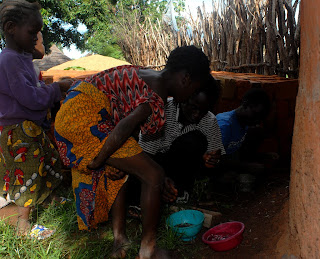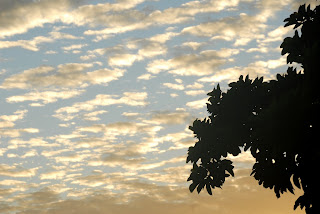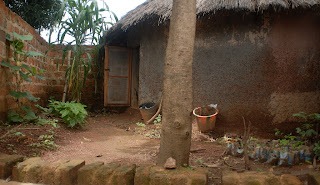Taxis are dangerous, slow, and not necessarily running on my schedule. So I bike whenever possible. One morning on the way home from Kankan, around 7 a.m., I passed a column of soldiers jogging in pseudo-organized columns. They were chanting "Get up, Stand up, Stand up for your rights" to keep the pace.
* * *
My hut is full of spiders. Most of the are small (size of the joint of my thumb) with a dark brown body and black joints. The body is round up to their spinners where it tapers off. (Read: "Mefloquine Nights") They eat everything else that lives in the hut - except, so far, Nyari and I. Their crowning beauty is the bright red hourglass on their bellies.
The body shape caught my eye - the hourglass made me extra cautious - because it's the same as a black widow's. I asked the Peace Corps medical officer if there are any dangerous spiders in Guinea. I told him we learned a lot about snakes and scorpions, but I see a lot of spiders that remind me of a potentially lethal species we have in America. He said the only way to know would be for me to catch one and bring it to him.
Using a rake and a piece of paper, I managed to catch two in a bottle. They decayed rapidly. So I caught two more and showed them to people around my village. They were all wondering what was wrong with me that I had spiders in a bottle. At least I am now assured that no one knows whether they're poisonous to people because they don't bite. Now they're just my resident roach killers.
* * *
A few months after a chameleon fell out of a tree right next to me in my back yard, I almost ran one over in the bush. I stopped just in time, picked it up, and put it in a tree. Before I could even get moving again some women from my village came around the bend. I always want to know the names of things, so I found it, picked it up again, and brought it over to them.
As I was lifting it to show them, they screamed and shocked me so badly I accidentally threw the chameleon up into the air as I spun around to see what was sneaking up on me. Nothing, of course. It turns out chameleons are actually sorcerers. If they change to the color of your skin or your clothing they gain power over you; the kind women were merely frightened for my metaphysical safety. The name in Maninka is pronounced "no see."
* * *
Because I'm white, I am automatically accorded doctor of medicine status. People constantly ask me for medicine or a diagnosis. Aside from one instance where I pronounced a kid a lazy, spoiled slouch, I refer them to their health center and real doctors. They rarely go, claiming poverty. There's a reason so many people here are blind or missing limbs. It's not lack of health care, it's a failure to value one's health. How many people in my village have lots toes, fingers or entire limbs because a small infection, easily treatable with Mercurochrome or soap, was ignored or deemed unworthy of attention? Many.
I recently had a chance to practice what I preach. I had a staph infection on my stomach about two inches in diameter. I started a round of antibiotics when a second infection appeared, but I was having trouble with the draining.
Once I got it to come to a head, I was able to squeeze it. I got about two teaspoons of blood and and a good piece of pus to come out. I'd never seen congealed pus before, so I went to the health center to ask if there was another way to get it all out. Doc said nope, just squeeze. Prends courage, ici c'est l'Afrique. I got most of it out, but there were still pieces embedded in the hole it left behind. I had to get the doctor to do the last scrubbing for me. I brought my gloves, surgical sterilizer, and sterile gauze; bit down on my rolled up shirt (no desire for dental problems resulting from ground teeth); and he cleaned it out.
I was able to save myself two potentially lethal days on the road by forgoing the anesthetic I could have gotten in Conakry. A worthy trade by any measure.
* * *

I've been helping my "brothers and sisters" collect termites when they pop out of the foundations of our huts. We grab the large, winged variety as they attempt to fly off. It was only after a couple weeks of effort that my oldest (still a bit younger than I) sister decided I, too, should eat them. I'd had my share of uncooked ones, but when she brought me the first plate of cooked ones I understood the effort. They're like popcorn with a protein kick.
She eventually showed me how to cook them and I even got a chance to do the whole process myself. Often when I cook with her I end up flinging stuff all over the place when flipping things in the air to remove wings, chaff, dirt, etc.
 My village has a huge hill that plummets to a seasonal stream and then climbs up a bit more. This is about half way up the larger hill looking over the village. Unfortunately I don't have a good filter to bring out just how beautiful this cloud was; a giant storm racing over the mountain.
My village has a huge hill that plummets to a seasonal stream and then climbs up a bit more. This is about half way up the larger hill looking over the village. Unfortunately I don't have a good filter to bring out just how beautiful this cloud was; a giant storm racing over the mountain. My buddy Musa showed me a nice swimming hole. I'm teaching him to swim. I took a photo of him trying, but I can't publish it because it sort of looks like he's drowning. And he wasn't.
My buddy Musa showed me a nice swimming hole. I'm teaching him to swim. I took a photo of him trying, but I can't publish it because it sort of looks like he's drowning. And he wasn't. Look at the corn stalks. The tree branches don't quite do justice to the strength of the wind in this gust front. It flattened half the corn fields in the village.
Look at the corn stalks. The tree branches don't quite do justice to the strength of the wind in this gust front. It flattened half the corn fields in the village.  I work with Sidiki to reforest. This is his rice field.
I work with Sidiki to reforest. This is his rice field. And this is what's behind his rice field. Gorgeous.
And this is what's behind his rice field. Gorgeous. This car is loaded down with fire wood. This is a small load compared to what a lot of cars carry. I just happened to have only taken this photo.
This car is loaded down with fire wood. This is a small load compared to what a lot of cars carry. I just happened to have only taken this photo. Remember that photo of the gust front and the corn? Nyari hid under a chair in my hut.
Remember that photo of the gust front and the corn? Nyari hid under a chair in my hut. Cat prison: a rope tied to a zip line. Why? The neighbors want his blood because he's a dirty, rotten thief. Stole chicken eggs, fish, meat... At least the other half of the neighbors liked him because he ate their mice. Nonetheless, he's in prison now. There was an unrelated incident where some kid told me he was going to eat my cat. He backed off when I told him I would eat his legs and arms, one per week until he ran out. You never know what a crazy American is liable to do.
Cat prison: a rope tied to a zip line. Why? The neighbors want his blood because he's a dirty, rotten thief. Stole chicken eggs, fish, meat... At least the other half of the neighbors liked him because he ate their mice. Nonetheless, he's in prison now. There was an unrelated incident where some kid told me he was going to eat my cat. He backed off when I told him I would eat his legs and arms, one per week until he ran out. You never know what a crazy American is liable to do.




















